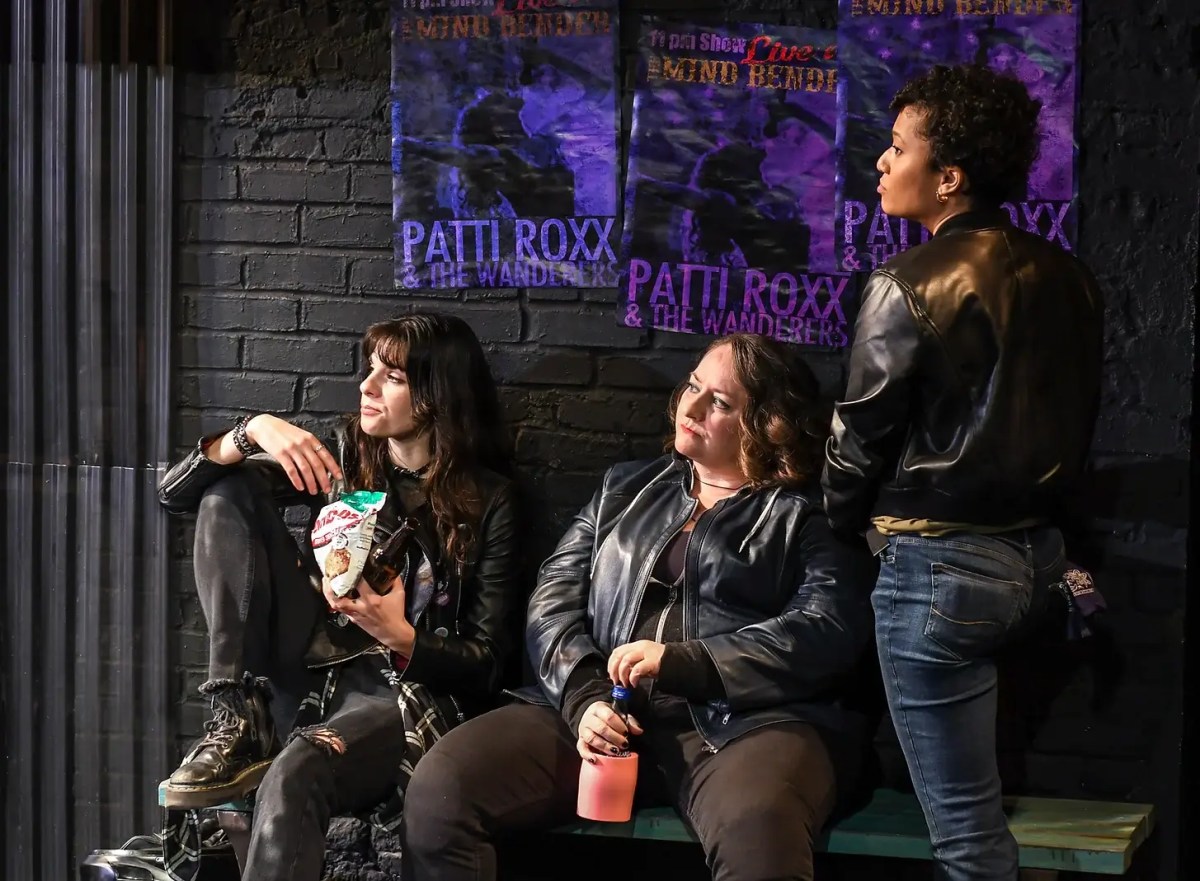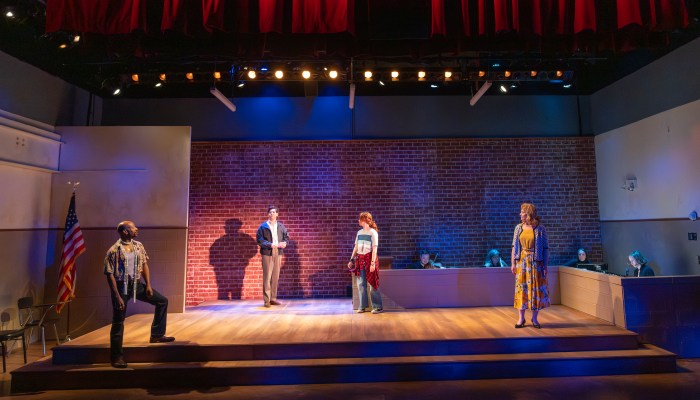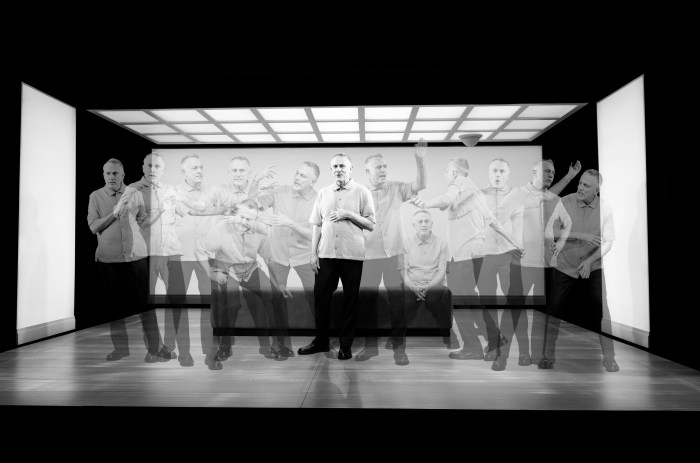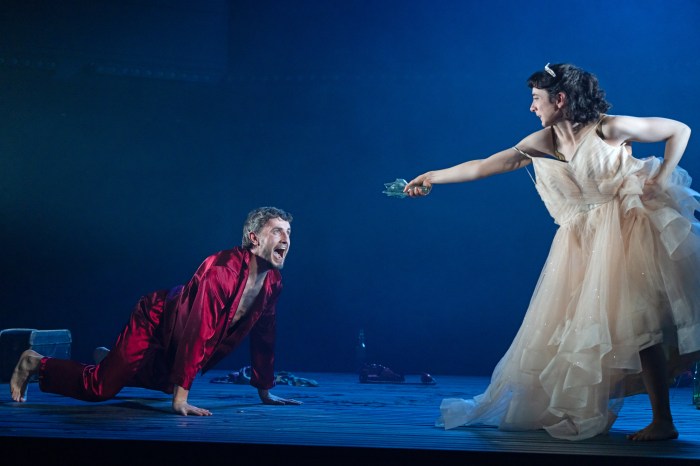“So much of my work is about a search for a home,” the playwright Kathleen Warnock said during a Zoom interview the day after her play, “Rock the Line,” finally got the New York premiere that COVID had postponed. “Not necessarily an apartment or a house. But a place where you are with other people who accept you as you are.”
In “Rock the Line,” home is the parking lot of a rock club in a rust belt city. It’s a space shared by seven rock fans who have shown up hours early to be the first in line to catch a show by their idol, Patti Roxx. They’re women with day jobs — including waitresses, a teacher, a paramedic, and a forklift operator — and a straight guy who repairs Xerox machines. All but two of them are queer, but they’re all searching for what Warnock calls a moment of grace, “when all is as it should be.”
For Warnock’s characters, a picture of what the world “should be” is what their idol Patti provides. Joan Jett is clearly the model for Patti, an unseen goddess whose voice is heard intermittently throughout the action. (In a bit of casting that will pop hard for anyone who has been a part of the East Village performance art scene over the past 40 years, Patti’s voice is played by downtown legend Penny Arcade.) Simultaneously defiant and utopian, Patti Roxx inspires, comforts, and in some sense creates the family of rebel girls and their pet straight guy who line up for admission to a night in queer paradise. Imagine being a working class lesbian in a packed rock club in, say, Buffalo, in 1980, and hearing Joan Jett sing, “My buddy and me don’t want to be like the rest, so don’t make us,” and you’ll get a sense of what Patti Roxx means to Warnock’s women.
In the mid-1990s, Warnock was one of those queer fangirls.
“I did a lot of getting out there and following Joan Jett and the Blackhearts, which was a blast,” said Warnock, who contributes to Gay City News. “This was before I was married. And I was writing for different cool publications. The ’zine scene in the ’90s was a lot of fun. So I wrote for “ROCKRGRL,” and I wrote for “Bust,” and I wrote for “Metal Maidens.”
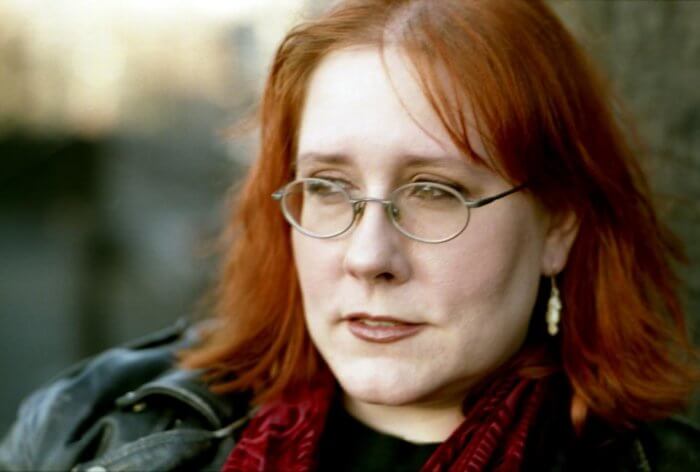
Some of the people she met on the road provided models for the women in “Rock the Line,” which opens with the play’s gay-girl couple staging a literal stand-off, shivering in the slight cold, declaring a truce over a shared bag of chips. They are joined by a school teacher who doesn’t get out much (“Does sex have to be two people?” she says, when she’s asked how long it’s been since she had any); a woman who was hounded out of the marines (the play is set early in the era of Don’t Ask, Don’t Tell); and a straight guy and the riot grrrl who doesn’t really want him. Their queer utopia is periodically disrupted by the play’s antagonist and tragic figure, a harrowed and harrowing rock star groupie who may or may not have been childhood pals — lovers? — with Patti.
Getting together in a public spot that they turn into their safe space, comfortable in their difference, Warnock’s characters fight and dream and sing and flirt. Maybe they want to reach out to each other for acceptance and love. Maybe they just want to get high and rock out. Is “Rock the Line” a queer take on the rock scene, or does it point out that rock has always been more than a little bit queer?
“I once, years ago, had a friend ask me, ‘When are you going to write something for everyone?’” Warnock said. “And I’m like, ‘I write for everyone. You can choose to see it or not come see it!’ If there’s enough truth, it’s universal.”
“Rock the Line” has been produced by TOSOS (The Other Side of Silence), the oldest LGBTQIA+ theater company in New York City, with the longest production record. Their artistic creed, Warnock says, is, “where the gays don’t die at the end.”
“It’s more important than ever to have queer theater companies and queer productions,” she said, given the sudden rise of nationwide anti-LGBTQ prejudice and violence, including government-sanctioned homophobia in Florida and elsewhere. Warnock, whose commitment to queer representation includes being a member of the community board in her Queens neighborhood, says, “Most people don’t think of my work as political. And yet it is. Within almost all my plays there are problems about how to live.”
The personal, in other words, is political. How to live on a tight budget and continue writing plays in an expensive city where real estate riches and COVID and the internet have made playwriting and producing much harder? That’s a problem for which Warnock’s exemplary writing career provides an answer. How to live in your own skin, and to be someone who both wants and fears love and connection, is a problem for which her play outlines at least a temporary solution.
“I’m a fallen-away Catholic, as you can imagine,” Warnock said, “but there are ideas in the church that have profound meaning for all of us. If we can achieve grace, that’s our highest state. And if losing ourselves in beautiful music, in a club, while you’re there with all your friends, and you’re hearing someone you idolize: if that’s your moment of grace, then have it.”
“Rock the Line” | The Flea Theater | 20 Thomas Street, New York, NY | Wednesdays through Saturdays at 7 p.m. | Runs through February 4

